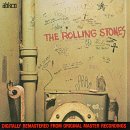The Rolling Stones: Beggar’s Banquet (1968) by: sydburnz
The Rolling Stones: Beggar’s Banquet (1968)
Mick Jagger — vocals, harmonica
Charlie Watts — drums
Bill Wyman — bass
Brian Jones — guitar, sitar, tambourine
Keith Richards — guitar
Nicky Hopkins — piano, keyboards
The Rolling Stones followed the path the Beatles took in 1966-67, and that was acid-influenced path. They were creating weird sounds and landscapes in the psychedelic genre. Well, on this effort, they fell back to their roots. And, it definitely has to be their best album. Not only do they cover the blues, they dabble in indian rhythms (Street Fighting Man), african rhythms and soul (Sympathy for the Devil), folk (No Expectations, Factory Girl), and country (Dear Doctor). This is their most musically diverse album and their most political. After all, it was released during the tumultuous year of 1968 when two american leaders were gunned down and riots sprouted up all over the US. Beggar’s Banquet‘s most well-known songs on this album are the singles “Sympathy for the Devil” and “Street Fighting Man”. Even if it wasn’t for these two magnificent singles appearing on this album, it would still be a very strong effort by the British bluesmen.
“Sympathy for the Devil” is a song about Lucifer and his involvement with the assasinations of political leaders. Mick Jagger has sneering vocals and Keith Richard’s counters with a spine-tingling guitar solo. “No Expectations” and “Salt of the Earth” are gentle ballads. The previous track is the better of the two. Salt of the Earth sounds too much like it came directly out of the Beatle’s catalogue. Nevertheless, they are tender, acoustic ballads.
“Dear Doctor” with it’s HeeHaw type melodies are rather refreshing and humorous at the same time. You need a good laugh after the political messages found in this album. Mick Jagger provides a falsetto vocal that sounds just like a boozed country woman. Dear Doctor is a satire on the hick communities of the south. You all may call them “white trash”. Nevertheless, a very amusing track.
“Parachute Woman” sounds like it was taken from the delta bluesmen and “Prodigal Son” sounds like a riff taken straight from Robert Johnson. Still, these are good deep blues tracks. Mick tries his best at sounding like Muddy Waters, or even Robert Johnson. At least he doesn’t fall on his face while trying to imitate his idols.
“Jig Saw Puzzle” is the longest track on the album, sprawling over 6 minutes. There is some amazing slide guitar playing on this blues-rock workout. This is not my favourite track on the album, but it still is a rather interesting listen. “Stray Cat Blues” is rather ironic, because most of the other tracks on this album dabble more into the blues. The track is more rock n roll than blues itself. Nevertheless, a good tune. “Factory Girl” is an english folk-influenced tune with some beautiful mandolin playing.
But, the best track on this album has to be the rocking “Street Fighting Man”. The opening chords just set the tone for the track. Very racuous indeed. Street Fighting Man was the anthem for the late 60’s. And if you thought that the guitar licks were enough, Brian Jones throws in some eloquent sitar playing. Perfect blend of rock and psychedelia in this song about revolution in the streets.
To review, this is a must get for any Rolling Stones, or even non-Rolling Stones fan. This was the Stones at their creative peak, making touching ballads and heavy rockers. Sympathy for the Devil, No Expectations, Parachute Woman, Prodigal Son, and Street Fighting Man are the highlights. There are no filler songs in this output, so it is a good listen from front to end. You should enjoy the step back into the roots of rock n roll. This album will showcase that.

